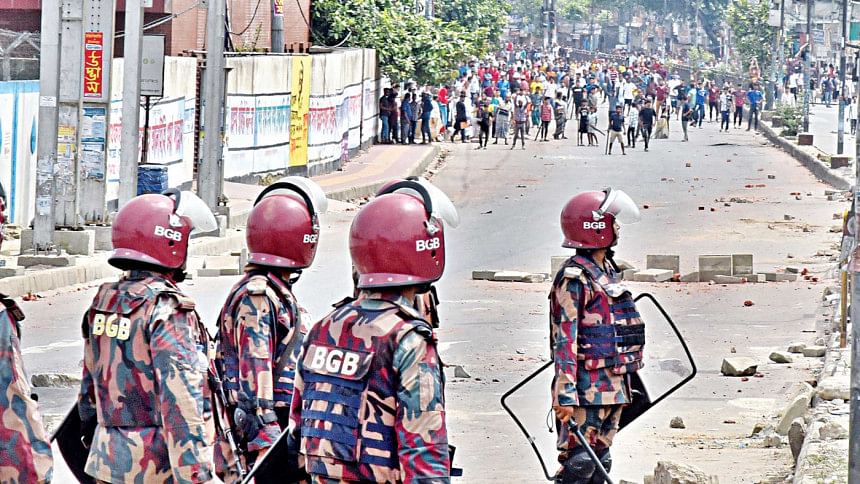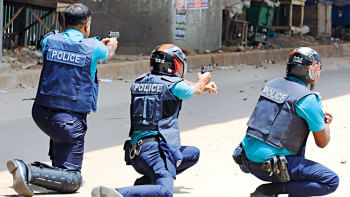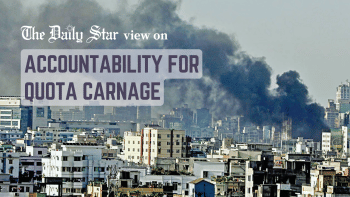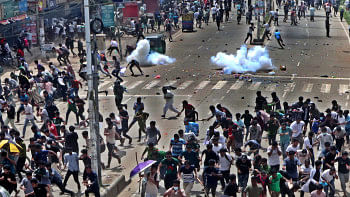Move away from blame game and confrontational power politics

The Appellate Division verdict of July 21 has opened the scope for resolution of the main issue around the demands coming from the quota reform movement. However, its observations associated with the judgment represent at least partial insensitivity to the bigger picture around the constitutional provision of equality and justice for the underprivileged section of society, especially women and Indigenous communities. The women's issue has been totally ignored, while the provision for Indigenous communities have been curtailed. One would hope that the government would exercise its leverage to address these critical issues before long.
Be that as it may, the nation has once again been reminded that student power is invincible, especially when fighting peacefully for a legitimate cause. Like many a time in the past, they have also shown the limits and fault lines of regime power that neglects lessons of history.
The student movement for quota reform, which challenged the prevailing state of discrimination in public service recruitment, cannot be in any manner linked to its violent and devastating turnaround. Though the movement and the violence were isolated from one another in terms of respective objective and means, what facilitated an unholy and unsurprising sync between the two is the country's confrontational zero-sum game of politics. From the beginning, there were clear replays of the ruling authority's usual practice of smelling in the quota reform movement a rot of conspiracy of the political opposition. The latter—as yet another example of its political bankruptcy—in the name of solidarity, took the quota reform movement as an opportunity for political mileage, for their core agenda against their political arch-rival.
Thus, when the student front of the ruling party, inspired by its general secretary, cracked down on protesters with the support and participation of law enforcement agencies, condoned by the partisan administration of most educational institutions, unprecedented violence was unleashed. What initially erupted in the campuses very quickly then spread nearly all over the country.
This opened the floodgates of mayhem by the subversive forces that have clearly been gaining from strength to strength in the space created for them by the confrontational politics between two major contenders. Needless to say, these subversive forces capitalised not only on the confrontational power game, but also on public discontent over growing economic hardships, governance deficits, and the atmosphere of intimidation and insecurity against free speech and freedom of association.
The kind of violence and destruction of public properties can represent nothing but evil designs and acts of such subversive elements. The cost of management failure of a crisis around a very genuine grievance of the young generation for justice, equality and non-discrimination in the public sector job market has already crossed enormous proportions. On top of all are at least 170 lives and countless injuries inflicted upon students, youth, and even children as well as professionals like journalists and police. Not to underestimate the huge loss of public properties, including key state installations and infrastructures.
But the economic cost of the deficit of political acumen in crisis management that catalysed the violent turnaround is going to be unprecedented in terms of disruptions of production, services, and businesses. A ballpark estimate of direct GDP lost is no less than $1.3 billion daily since July 18, when everything came to a standstill, including the internet being shut down, unprecedented not only in Bangladesh but perhaps anywhere else in the world. Beyond the monetary value, the cost of public suffering and harassment for being deprived of various essential services including utilities, not to speak of the mental stress and agony, is mind-boggling. Whether the continued internet shutdown is attributable to reported damages caused to relevant infrastructure or whether it is because of the failure to determine how to cope with implications of the free flow of information and opinion remains an open question.
With such baggage, whether Bangladesh will continue to be treated as the second most attractive destination for foreign investment in the region is anyone's guess. The same can be said about the time needed for our development and foreign trade partners and even the employers of our stranded expatriate workers to regain the eroded confidence.
No less important is the national and international implications of the information and images of human rights violations unleashed by the attackers on the movement as well as the disproportionate use of force by law enforcement agencies, despite the foreign ministry's invitation to follow the ostrich syndrome. Equally disturbing will be the possible impressions of us as a violence-prone society created by the images of destructions by the subversive elements who took advantage of the crisis.
The key lesson of the crisis, therefore, is that intransigence, non-responsiveness, denial of reality or overconfidence of absolute power, and use of disproportionate force do not serve the purpose and can only be counterproductive and self-defeating.
The more the regime power is detached from the people and public interest, the more fragile and vulnerable to governance deficits and political failings it can be. Vulnerabilities are further accentuated by partisan control of state institutions, which may serve only short-term interests at the expense of a greater public good.
Moving on, the top priority is to ensure safety and security of the striking students. Ministers have promised no legal or administrative action against the students, which may be encouraging. But the question is whether the government or relevant agencies will walk the talk in a "securitised" context where some actions do not require legal or administrative mandate, like the reported abduction and torture of one of the coordinators of the movement, Nahid Islam. To be sure, this is nothing new nor isolated, while such "operations" not only remain unaccountable but also assume their own dynamics outside mainstream governance structure.
It is indispensable to ensure exemplary accountability and justice for the victims of perpetrators of violence against the striking students and others who were victims of abuse by both politically patronised power and the institutionally mandated authority, like the point-blank shooting down of a student in Rangpur. Failure to do so will further erode public trust in the government and the state institutions.
No less important is to identify and bring to justice those responsible for orchestrated violences, targeted attacks and enormous damages caused to public properties, including some key institutions. But as experience has also shown, ensuring accountability of perpetrators alone is not enough, especially leaving the breeding ground open on a daily basis for such militant forces to grow. On top of preventive measures is the imperative of moving away from the politics of blame game and confrontation for power, with a view to putting back public interest and people's participation at the core of political culture.
Dr Iftekharuzzaman is executive director at Transparency International Bangladesh (TIB).
Views expressed in this article are the author's own.
Follow The Daily Star Opinion on Facebook for the latest opinions, commentaries and analyses by experts and professionals. To contribute your article or letter to The Daily Star Opinion, see our guidelines for submission.

 For all latest news, follow The Daily Star's Google News channel.
For all latest news, follow The Daily Star's Google News channel. 






Comments